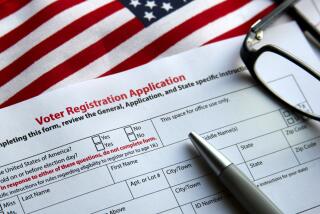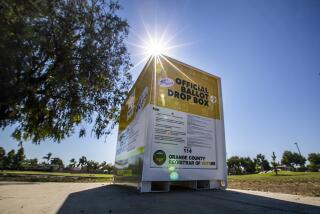A Sunni Boycott of Vote Could Sink Its Credibility
- Share via
BAGHDAD — Excluding certain rebellious towns from Iraq’s parliamentary elections might not seriously damage the credibility of the vote, but a broad boycott by Sunni Muslims is a potentially grave threat to the process, a senior U.S. official said Sunday.
“You could have a town or two that didn’t participate” and it wouldn’t be terrible, said the official, speaking on condition of anonymity. “If it’s whole communities, then that’s where you have a serious political problem.”
With voting planned for Jan. 31, Iraq’s insurgency remains a serious problem. Secretary of State Colin L. Powell said Sunday that violence is “getting worse and the reason is that [insurgents] are determined to disrupt the election.”
In the next few months, Powell said, U.S. troops will work to oust insurgents from Fallouja and other cities in the Sunni Muslim heartland and help the interim Iraqi government reassert control over those areas.
Fallouja has become a “no-go” zone for U.S. troops and international organizations such as the United Nations, which are supposed to help prepare for the elections.
“Our military commanders are gathering their resources and starting to put in place plans that will deal with these so-called no-go zones,” Powell said on CNN’s “Late Edition.”
But the senior U.S. official said the military campaign was less important than a political campaign to persuade Sunni tribal, religious and political leaders not to abandon the voting.
“If what you have is an election with a whole ethnic area that isn’t there,” he said, “then that’s a problem because then you have a parliament that Sunnis will not regard as legitimate.”
Sunnis are a minority in Iraq but long enjoyed favored status under Saddam Hussein, a member of the group. Failure to coax the Sunnis to participate in the nation’s new political process risks permanently alienating them, entrenching the insurgency and dooming attempts to form a cohesive Iraqi state.
In recent days, U.S. and Iraqi officials have begun to acknowledge that some areas may be excluded from voting.
Defense Secretary Donald H. Rumsfeld said Thursday that elections that encompassed “three-fourths or four-fifths of the country” would be acceptable. And on Sunday, Gen. John P. Abizaid, head of U.S. Central Command, told NBC’s “Meet the Press” that he “can’t predict 100% that all areas will be available for complete, free, fair and peaceful elections.”
Iraqi Deputy Prime Minister Barham Salih said it would be unfair to “hold the entire process hostage” to one rebellious region.
“Any area that will hold out and create trouble, they risk being isolated and losing their voice,” he told Associated Press.
Fallouja, where U.S. troops keep to the outskirts and launch regular missile strikes, is a prime candidate for exclusion.
The U.S. military on Sunday continued airstrikes there, killing eight and wounding 17, local hospital officials said. Meanwhile, a pair of car bombs exploded at an Iraqi national guard base on the outskirts of the city. Details on casualties were not available.
The Sunnis controlled Iraq’s politics for decades. Now, U.S. and Iraqi government officials must persuade Sunni leaders to participate in an election that seems guaranteed to formally end their dominance.
“The argument would be ... that they can protect themselves better by being in the game than out of the game,” the senior U.S. official said. “By being out of the game, you end up with an elected government that ain’t you.”
So far, results of the lobbying effort have been mixed. The Muslim Scholars Assn., influential Sunni clerics who oppose the U.S. presence and the interim government, has announced plans to boycott the elections.
Lobbying has been complicated by the decentralized nature of the Sunni leadership, which is spread among a constellation of political figures, clerics and tribal sheiks. These leaders, the U.S. official said, are reluctant to risk losing their credibility or becoming a target by publicly embracing elections. Citizens are also likely to avoid the process out of similar fears.
“I think there are people in Fallouja that would like to vote, but I don’t think they’d be willing to show up at a polling station right now, assuming we can get one open,” he said.
An excluded and disenfranchised Sunni community could also fuel insurgent attacks that would disrupt electoral proceedings well beyond the Sunni heartland.
An elections expert with experience in Iraq and other post-conflict situations said electoral violence is hardest to deal with when it comes from “a hard-core group that has excluded themselves.”
“If the goal of the violence is to disrupt or prevent the entire process, then it’s harder to deal with in an electoral context,” he said. “Then you’re talking about military solutions.”
Staff writer Peter G. Gosselin in Washington contributed to this report.
More to Read
Get the L.A. Times Politics newsletter
Deeply reported insights into legislation, politics and policy from Sacramento, Washington and beyond. In your inbox twice per week.
You may occasionally receive promotional content from the Los Angeles Times.









